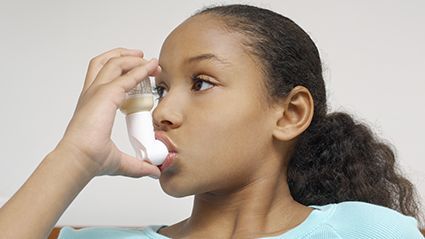
Asthma experts I spoke with have all agreed that reduced viral exposure likely played a part in the drop.
By Nazarul Islam
People who normally worked outside their homes however, had bigger decreases in asthma attacks than those who worked at home (65 percent compared with 23 percent), perhaps because they were no longer being exposed to viruses and irritants at work. And people whose type of asthma is driven by environmental triggers also saw bigger improvements than those whose asthma is driven more by underlying inflammation.
All this has suggested that people really were able to avoid triggers during the pandemic.
Ordinary respiratory viruses may play a bigger role in asthma attacks than previously thought, the pulmonologist had cautioned.
People with asthma, like everyone else who masked up and practiced social distancing, were this year exposed to many fewer viruses known to trigger flare-ups. Even asymptomatic infections that normally go unnoticed might cause an asthma attack in someone whose airways are especially sensitive. “That extra irritation, that extra inflammation, pushes them over the edge,” Dr. Sidat had said.
Asthma experts I spoke with have all agreed that reduced viral exposure likely played a part in the drop, but the pandemic changed so many things at once that other factors are hard to rule out. Staying at home might have made it easier for people to keep up with their regular long-term asthma medication.
They were also no longer exposed to potential triggers at work or school, such as diesel from school buses or chemicals in cleaning products. Asthma can be very individual, with exact triggers varying from person to person. But the overall picture is impossible to ignore: The sweeping changes to our social lives during the pandemic made asthma a lot easier to control.
However, If viruses indeed played a bigger factor in asthma attacks than initially thought, doctors may have been mistakenly fixating on other factors. “We’ve forever talked about the environmental contribution to asthma. There are pollutants and irritants and allergens inside the home,” says an expert, who is also a member of the Asthma and Allergy Foundation of America’s Medical Scientific Council.
If these factors really were so important, though, asthma attacks should have gone up, not down, during the pandemic.
It has long been routine for doctors to question parents of kids with asthma about dust mites or cockroaches or smoking in the home, says Christopher Carroll, a pediatric-critical-care doctor at Connecticut Children’s. He’s asked these questions himself. But, he says, “The unstated implication when you’re asking about triggers like that is that those are causes of your child’s asthma.”
This has the effect of blaming patients or parents of patients, when factors outside the home might actually play a bigger role. “We have this paternalistic attitude in medicine,” adds Janine Zee-Cheng, a pediatrician in Indiana. “You’re noncompliant with your medicines. Or you’re not monitoring your kid’s meds. Or you’re smoking indoors.” It’s “doctor knows best”—but the pandemic has exposed how much doctors did not know.
Rethinking the role of viruses in asthma attacks is a bit more complicated in practice. COVID-19 precautions tamped down every other respiratory virus, but those precautions won’t last forever. Cases of respiratory syncytial virus, one cause of the common cold, have already spiked. Carroll expects that he will keep wearing a mask in hospitals, but masks are coming off everywhere else.
More and more now, wearing one means sticking out. And unfortunately, the health benefits of a face mask have also been overwhelmed by its potency as a political symbol.
This is what worries Tania’s parent, as she goes off with her friends and begins pre-K in the fall. She can’t keep Tania cocooned forever. Her daughter will be exposed to viruses. “I would be lying if I said it didn’t make me anxious,” her father mentioned. Masking up in the winter seems like a no-brainer, but she can already imagine the judgment her family might face. This choice isn’t about politics, though. It’s about Scarlett’s asthma.
Tania’s dad also remembers the two Thanksgivings in a row when she got so sick, she had to be hospitalized. It didn’t happen this past year and Thanksgiving. And we all hope it never happens again.
Courtesy: NW Atlantic/ Global Health
[author title=”Nazarul Islam ” image=”https://sindhcourier.com/wp-content/uploads/2021/05/Nazarul-Islam-2.png”]The Bengal-born writer Nazarul Islam is a senior educationist based in USA. He writes for Sindh Courier and the newspapers of Bangladesh, India and America. He is author of a recently published book ‘Chasing Hope’ – a compilation of his 119 articles.[/author]